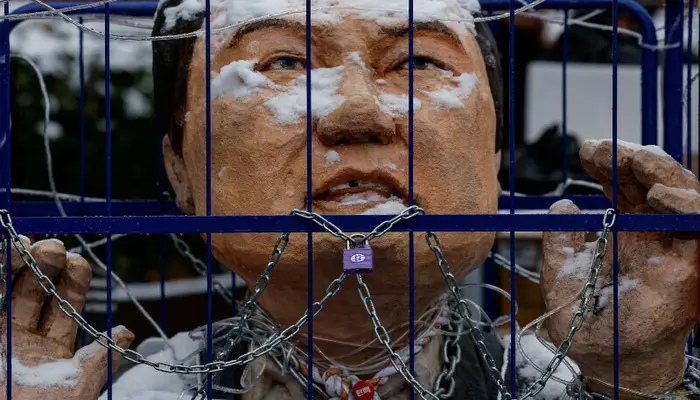
Thousands of South Koreans gathered in Seoul despite heavy snow to protest for and against the arrest of impeached President Yoon Suk Yeol. As the deadline for his arrest warrant approaches, the country finds itself embroiled in a deepening political crisis. The keyword, “Yoon’s arrest,” underscores the tension dividing the nation.
Protests Intensify Ahead of Deadline
Demonstrators flooded the streets near Yoon’s official residence, with some calling for his immediate detention and others demanding his protection. The arrest warrant, issued over alleged insurrection tied to a failed martial law attempt on December 3, expires at midnight on Monday. This incident has plunged South Korea into political turmoil, as Yoon became the first sitting president to face such charges.
Impeachment and Standoff
Parliament impeached Yoon, suspending him from his official duties. The Constitutional Court now decides whether to reinstate or permanently remove him. On Friday, a dramatic six-hour standoff occurred when Yoon’s security service and military troops blocked criminal investigators attempting to arrest him.
The Seoul Western District Court dismissed Yoon’s legal team’s complaint, declaring the arrest warrant valid. However, Yoon’s lawyers argue that the Corruption Investigation Office for High-Ranking Officials (CIO) lacks the authority to investigate insurrection cases under South Korean law.
Legal Challenges and Security Concerns
Yoon’s legal team plans to report CIO chief Oh Dong-woon and the investigation team to prosecutors. They claim the warrant’s execution, including police involvement, was illegal. “If there is an error in enforcing the law against the president, it poses a significant issue,” said Seok Dong-hyeon, a legal advisor to Yoon.
The CIO has yet to respond to these allegations, while calls for judicial clarity intensify.
Read: South Korea’s Arrest Warrant for President Yoon
Protesters Brave Harsh Weather
Protesters endured freezing temperatures and heavy snowfall to voice their opinions. Labor groups, including the Korean Confederation of Trade Unions (KCTU), led anti-Yoon rallies, demanding swift legal action. “We must punish a president who defied the constitution,” said KCTU leader Yang Kyung-soo.
Meanwhile, Yoon’s supporters rallied nearby, holding signs like “We will fight for President Yoon Suk Yeol” and “Stop the Steal.” The latter phrase mirrored protests by former U.S. President Donald Trump’s supporters after the 2020 election.
Escalation and Police Response
Saturday’s demonstrations drew tens of thousands, leading to road blockages and clashes with police. Authorities detained two protesters for allegedly assaulting officers. The CIO has repeatedly urged acting President Choi Sang-mok to order compliance with the arrest warrant, but the finance ministry has remained silent.
The Road Ahead
As the arrest deadline looms, the country faces a critical turning point. Whether Yoon is detained or remains free, the political ramifications will ripple through South Korea’s government and society. The ongoing protests reveal a divided nation grappling with the balance between constitutional law and political allegiance.
Follow us on Google News, Instagram, YouTube, Facebook,Whats App, and TikTok for latest updates
